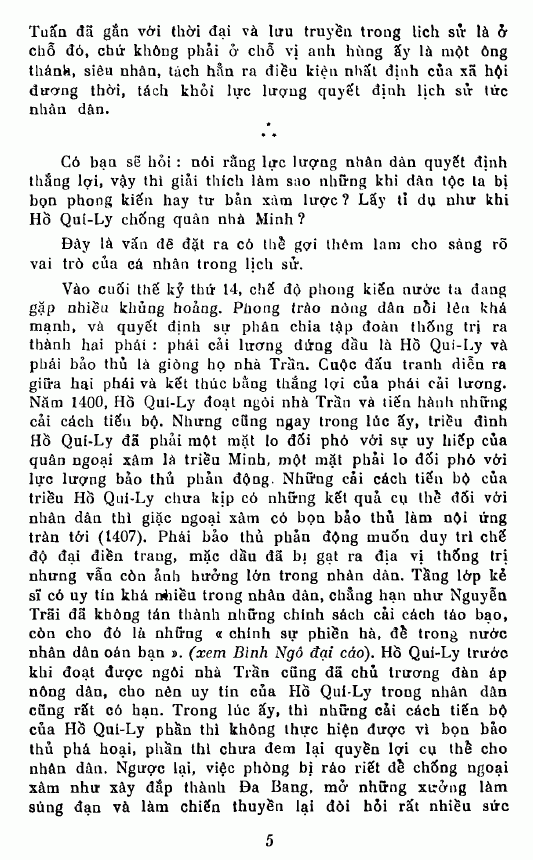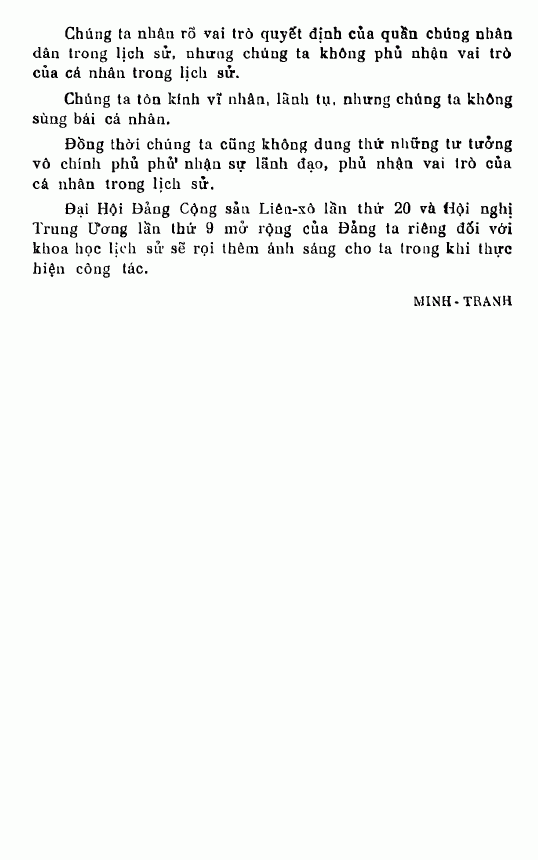In June of 1956, Minh Tranh published an article in Văn Sử Địa with the long and awkward title of “Oppose the worship of individuals, but it is necessary to recognize the role of individuals in history” (Chống sùng bái cá nhân, nhưng cần nhận rõ vai trò cá nhân trong lịch sử). This article was clearly written in reaction to events which had transpired earlier that year in the Soviet Union.
In February of that same year, Nikita Khrushchev gave a report at the Twentieth Party Congress inMoscowentitled “On the Personality Cult and its Consequences.” This report constituted a critique of various aspects of Joseph Stalin’s rule and of the personality cult (or “cult of the individual”) that had developed around him.
This was followed in March by an editorial in Pravda entitled “Why the Cult of the Individual is Alien to the Spirit of Marxism-Leninism,” some of which Minh Tranh cites in his article.
The promotion of individual heroes was a critical element in Vietnamese nationalism. With Krushchev’s denunciation of the cult of the individual, Minh Tranh appears to have tried in this article to find a way to save these “personality cults” that were essential for Vietnamese nationalism.
Minh Tranh begins this article by noting that “Human society has existed and developed based on never-ending struggles; the struggle with nature and social struggles.” He then points out that it is not individuals who engage in these struggles, but groups of people, particularly workers and producers (người lao động sản xuất).
This is why, Minh Tranh notes, Marx stated that “the history of human society is first and foremost the history of producers” (Lịch sử xã hội loài người trước hết là lịch sử những người sản xuất). Actually what Marx and Engels wrote in the Communist Manifesto in 1848 was that “The history of all hitherto existing society is the history of class struggles.” In any case. . .
Minh Tranh then asks if this means that the individual plays no role in history. “No,” he responds. Individuals do play a role in historical processes, however they do not play a defining role. That role is performed by the workers.
He then states that Vietnamese everywhere have always felt proud of their history and of the heroes who represent their nation, such as the two Trưng sisters, Ngô Quyền, Trần Quốc Tuấn (i.e., Trần Hưng Đạo), Lê Lợi, Nguyễn Huệ, and now Hồ Chí Minh.
Minh Tranh then clarifies here that pride in one’s nation then leads people to “revere” (tôn kính) heroes, because this is a way of expression one’s pride in one’s nation. This, he argues, is very different from the worship (sung bái) of individual heroes, which Minh Tranh says is a form of superstition (mê tin), because individuals are seen as divine gods (thần thánh) who decide all, while the people (nhân dân) are disregarded.
Minh Tranh then goes on to look at the case of Trần Hưng Đạo. Here argues that Trần Hưng Đạo is a hero because he succeeding by working together with the people. He was not some divine being who had supernatural powers.
There is much more to this article, but I will stop here. I posted an article recently about someone who visited Trần Hưng Đạo’s temple in 1942 in Kiếp Bạc in order to pay his respects to Trần Hưng Đạo the national hero only to find the temple overrun by people who were worshiping Trần Hưng Đạo as a deity. The author of that article criticized these “superstitious” practices, but did not call for their elimination.
This article here goes a step further in delimiting what is acceptable about Trần Hưng Đạo. In response to Krushchev’s denunciation of Stalin’s personality cult, Minh Tranh strives to eliminate any such worship of Trần Hưng Đạo as an individual or a supernatural deity. Instead, to Minh Tranh, Trần Hưng Đạo could only be honored as a representative of the nation as a whole.
In her book on Trần Hưng Đạo, Phạm Quỳnh Phương argues that Trần Hưng Đạo has always been revered as a hero of the nation. If you read what is written about him in historical sources, from the Đại Việt sử ký toàn thư onward, it is clear that this is not the case. It’s only in the twentieth century that Trần Hưng Đạo came to be regarded as a hero of the “nation” (dân tộc) because it’s only in the twentieth century that Vietnamese started to think of themselves as a nation, and to find the need for “national heroes.”
Minh Tranh’s article here is part of this process of creation. It was written in a rather unique context – by a Marxist in the aftermath of Krushchev’s denunciation of Stalin’s personality cult – but it’s effort to distance Trần Hưng Đạo the national hero from the worship which surrounded Trần Hưng Đạo the deity was part of a larger process which was already underway by that point.
Vietnamese nationalists needed national heroes. Creating them was a challenge as the religious beliefs of common Vietnamese and the changing orthodoxy of international Marxism got in the way.













This Post Has 4 Comments
Hi,
I am an subscriber of your blog.
I found it difficult to agree with you on the following statement: “it’s only in the twentieth century that Vietnamese started to think of themselves as a nation, and to find the need for “national heroes.”
In my view, Vietnamese people started to think so from as early as 938 when Ngo Quyen liberated what is now northern Vietnam from the Chinese rule.
How can you explain your statement?
Thanks for the question, and I’m glad to hear that you subscribe to the blog. Your question warrants a complex answer, which I’m probably not going to succeed at providing, but let’s start by looking at it this way, the term “national hero” (anh hung dan toc) can not be found in any Vietnamese text prior to the 20th century. This is because the term “nation” was a new term and concept which was introduced into the Vietnamese language and society in the early twentieth century (and the term “hero” wasn’t used all that much). The concept of the nation emerged in the West. After monarchies were overthrown (like in the French revolution), people in power sought a new point of focus for people. Whereas when there were kings and queens people were loyal to the king or queen, without a king or queen people were encouraged to focus their loyalty on the “nation.” How was this achieved? By setting up schools across the land and teaching people about the nation, its history and culture. Something had to already be there for this to happen. There had to have already been famous people from the past, and there had to be cultural practices which could be promoted as part of the “national” culture, but in doing this, there was a lot which was re-interpreted and invented.
In the late 19th century and early 20th century, these ideas spread to Asia. If you read Vietnamese historical sources from the early twentieth century, you can see that reformers tried to introduce and promote the concept of the nation, and they also started to talk about national heroes. Their goal was to get everyone in the land to know about these people and to identify with them. Prior to the 20th century, educated people in Vietnam knew about Ngo Quyen and thought that he had played an important role in the history of the kingdom, but how many illiterate peasants did? Did peasants in the Mekong delta know about Ngo Quyen? If so, how did they learn about him if they didn’t go to school? In other words, prior to the 20th century, I would say that Ngo Quyen was a figure whom educated people knew had played an important role in the kingdom’s history, but he was not a “national hero” because there was no effort to get everyone in the land to know about him and to identify with him and the nation. When reformers in the early 20th century started to do this, Ngo Quyen was a great source which they could use to do this, but that was something new, and in their writings at the time they made it extremely clear that they were doing something new. They stated directed that the nation had no heroes, but that it needed them.
Does this make sense? The big issue is that there was a major intellectual transition which took place in the early 20th century (and not only in Vietnam, but also in China, Japan, Korea, Thailand, etc.) where people started to see the world in terms of “nations” with “citizens” rather than “kingdoms” with “subjects.” This was a multifaceted transformation which had many aspects to it, and it was so thorough that today it is very difficult for people to imagine that people could have thought differently in the past than they do today (for instance, do you realize that the word “liberate” [giai phong] is also a 20th-century term, and that no text prior to the 20th century says anything about Ngo Quyen “liberating” anything? There are many many concepts like that which are new, but people today don’t realize it.). But there is plenty of textual evidence which shows this transformation. Some of it can be found in the posts below.
http://leminhkhai.wordpress.com/2011/04/04/imprinting-the-nation-in-early-twentieth-century-vietnam/
http://leminhkhai.wordpress.com/2011/04/06/rethinking-the-past-in-early-twentieth-century-vietnam/
http://leminhkhai.wordpress.com/2011/04/10/vietnamese-historical-ideas-in-the-mid-twentieth-century/
Thanks for your kind and deeply thorough reply.
I am convinced by your rhetoric. Let me summarize your explanation. Ngo Quyen led his army against the North (quan phuong Bac), and this was purely a consequential response to its long brutal rule. It could not have occurred to him that his uprising would be assessed as a kind of national liberalization a millennium later. It is the intellectual reformists who interpreted Ngo Quyen’s rebellion as the liberation by a “hero” for his “nation.”
Concerning your minor mention in the bracket, I fully understand that the term liberisation is also a new term that only emerged in early 20th century.
Hope to see your upcoming posts soon!
This is almost what I think. I would go a little bit further and say that I have no idea if Ngo Quyen was thinking about the “long brutal rule” of the North, or if he just wanted power, or if there was some other ideas in his head. There were other people who fought for power at the same time, some of whom were Chinese. Ngo Quyen supposedly even allied himself with a Cantonese warlord for a while. So was he fighting for some larger cause? Just to gain power? I have no idea. What I do know is that to say that he was fighting for “national independence” is to project 20th-century ideas back 1,000 years into the past, because that is an idea which was clearly introduced in the 20th century. That is what nationalism does, however. It argues that people have always thought the same way. They haven’t. This doesn’t mean that people in the past didn’t do things which we can admire today. They did. But historians should try to understand and explain things in their proper historical contexts. So I would say that in the 10th century Ngo Quyen fought to gain autonomy for a kingdom, whereas in the 20th century Ho Chi Minh fought to gain independence for a nation. There are similarities between these two phenomena, but there are differences too.